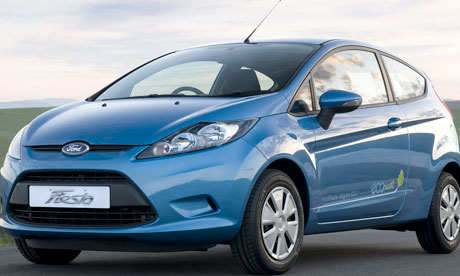
Car sales fell 4.4% last year to their lowest level since 1994 as a strong 2011 for manufacturers failed to be reflected in showrooms across the UK.
Total new registrations were 1.94m, with the Ford Fiesta the best-selling vehicle, according to figures from the Society of Motor Manufacturers and Traders. It is the lowest total since 1994, when 1.91m cars were sold.
New car sales are a bellwether for British consumer sentiment rather than industrial strength. About eight out of 10 cars built in the UK are exported and Friday's SMMT figures confirmed that the industry's domestic and export markets are on divergent paths. Car manufacturing has recovered more strongly from the credit crunch than UK saes, with production forecast to increase this year and next.
Paul Everitt, SMMT chief executive, said a rebalancing of the UK economy – away from consumption and towards production – would produce these "unusual" figures.
"With this whole concept of rebalancing the economy, this is what you would expect to see," he said. "Consumer demand is weaker but at the same time we are seeing a strong performance in some key segments of the manufacturing economy."
The SMMT expects 2012 sales to be flat on this year's total, with 2013 staging a "firmer" recovery. Everitt expressed concerns over a consumer market that is now at lows not seen since the early 1990s. Although total car sales declined 4.4%, that figure would have been even worse were it not for a strong performance in fleet sales, driven by demand for hire cars and company cars. Consumer sales slumped 14%.
"The consumer in 2011 is as anxious as they have been since the early 1990s. It is not surprising given the level of concern that people have had about jobs, squeezed living standards and the instability of the eurozone," said Everitt.
Higher petrol prices also appear to have influenced consumer behaviour, with diesel and alternatively fuelled cars taking record market shares in 2011. Sales have fallen against a backdrop of less frequent vehicle use as well, with road traffic falling 1.6% in 2010. The top five was rounded out by the Ford Focus, the Vauxhall Corsa, the Volkswagen Golf and the Vauxhall Astra.
Manufacturing was also propped up by a government scrappage scheme, which subsidised the replacement of dated vehicles with cars straight off the production line, whose expiry in 2010 also affected today's numbers, with 2011 sales struggling to match the 2010 data as a consequence. Nonetheless, strong demand in China, the US, and India has helped Britain's car factories outperform its showrooms as facilities owned by the likes of Nissan, Toyota and Jaguar Land Rover prepare for another year of strong demand. The SMMT expects the UK industry to manufacture around 1.5m cars this year, up 5% on last year, with the 2012 total rising to 1.6m.
Consultancy firm Deloitte said it expected a decline in car sales in 2012 to 1.84m vehicles, as demand across Europe struggles. David Raistrick, Deloitte's head of UK manufacturing, said: "We believe total new car registrations for 2012 will be relatively low – around the 1.84m mark. There is no doubt that 2012 is going to be a tough year. I expect there will be a levelling off for sales in new and used car sales, both in the UK and more widely across Europe."
Neil King, an automotive analyst at Euromonitor, said the figures showed the weakest performance since 1994. "The fall in new car sales in 2011 compared to 2010 comes as no real surprise following the introduction of the 20% VAT rate and the fact that demand was still bolstered by the scrappage scheme in the first half of 2010. However, with just 1.941m new cars sold in 2011, this is the UK's weakest performance since 1994 and it is rather worrying that demand was even down in the second half compared to a weak, post-stimulus second half of 2010. Mercifully, fleet demand continues to recover and limited the market's decline to just 4.4% but the outlook naturally remains weak until the eurozone crisis is resolved, unemployment stops rising and, ultimately, confidence levels improve."

